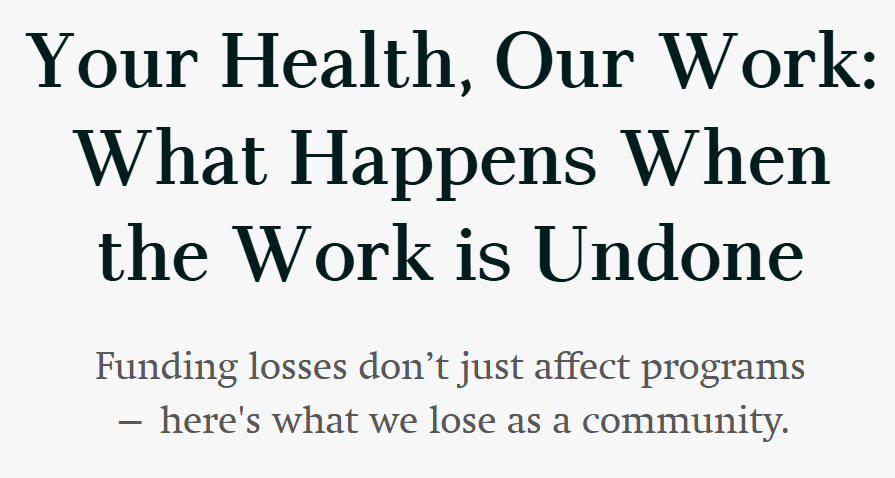StoryMap Illustrates Threats to Austin’s Health with Federal Funding Disruptions | AustinTexas.gov
Austin Public Health faces a funding crisis with changes in federal grant funding. Without additional resources, some essential services will be reduced or eliminated. As of July 14, 2025, APH has already lost or is at risk of losing 9.5% of its total grant funding, forcing program cuts. Changes in funding affect the program’s capacity to provide mobile testing, reaching out to clients who may not be able to access the clinic. Without funding, the TB Clinic offers critical testing and treatment for one of the world’s deadliest infectious diseases. The Refugee Health Clinic offers comprehensive health screenings, immunizations and referrals to refugees, asylees, victims of human trafficking and other individuals arriving from countries in crisis. The HIV/STI program provides confidential testing, treatment, and prevention services, especially for uninsured residents.
Read full article ▼
Austin Public Health faces a funding crisis with changes in federal grant funding. “These changes pose serious challenges, and without additional resources, some essential services will be reduced or eliminated,” said Adrienne Sturrup, Director of Austin Public Health. “That’s the reality we are facing. Still, Austin Public Health will do everything in our power to protect the health and safety of our community. We will not stop advocating for the support we need, even as we make tough decisions and adapt to these difficult circumstances.” The public health department is unique in that half of APH’s staff are supported by grant funding. Nearly half of the department’s overall budget also relies on these external dollars. As of July 14, 2025, APH has already lost or is at risk of losing 9.5% of its total grant funding, forcing program cuts that jeopardize community health outcomes. Mobile Vaccination Program (MVP): MVP is tasked with visiting hundreds of locations across the area to deliver much-needed vaccines to thousands, especially uninsured or underinsured community members. This team once operated with 15 staff members, bringing lifesaving vaccines directly into neighborhoods, building the community’s resilience against the pandemic, and most recently against the state’s measles outbreak. Now, staffing is reduced by more than half. Public Health Emergency Preparedness (PHEP): PHEP works closely with local, state, and federal emergency management authorities to plan and prepare for any emergency that affects the health of the public. Public health emergencies include natural disasters, like recent flooding. disease outbreaks like COVID-19, bird flu and measles, as well as those related to homeland security, such as a biological or chemical terrorist attack. This team’s work makes Austin and Travis County more resilient to any disasters that may come our way. HIV/STI Community Testing: The HIV/STI program provides confidential testing, treatment, and prevention services, especially for uninsured residents. Changes in funding affect the program’s capacity to provide mobile testing, reaching out to clients who may not be able to access the clinic. Refugee Screening Clinic: APH’s Refugee Health Clinic offers comprehensive health screenings, immunizations, and referrals to refugees, asylees, victims of human trafficking and other individuals arriving from countries in crisis. Many are navigating trauma and a new healthcare system. The clinic also supports families with pediatric appointments, prescriptions and access to community resources. Without funding, the clinic would be forced to close, leaving families to pay hundreds out of pocket for legally required services. Tuberculosis (TB) Clinic: The TB Clinic offers critical testing and treatment for one of the world’s deadliest infectious diseases. Many refugees come from regions where TB is common, making early detection essential. The clinic helps protect individuals and prevent the spread of disease, ensuring Austin remains a safe and healthy city for all. Disease Surveillance: The Epidemiology and Disease Surveillance Unit (EDSU) monitors disease trends, detects outbreaks early and implements timely interventions to prevent the spread of infectious diseases like influenza, COVID-19, measles and foodborne illnesses. Loss in funding would affect our community’s health as a whole and decrease our resilience to disease outbreaks and disasters. “The loss of these experienced staff cannot be overstated,” said Dr. Desmar Walkes, Austin-Travis County Health Authority. “Their expertise is vital to a quick and effective response. Keeping them ensures our community remains resilient. Just as we have long relied on vaccines to prevent serious childhood illnesses like measles and pertussis—diseases that once caused widespread suffering and death—we must continue to uphold and strengthen these protective measures across public health programs, including those for tuberculosis, HIV, and other sexually transmitted infections.” You can find the full StoryMap here .

